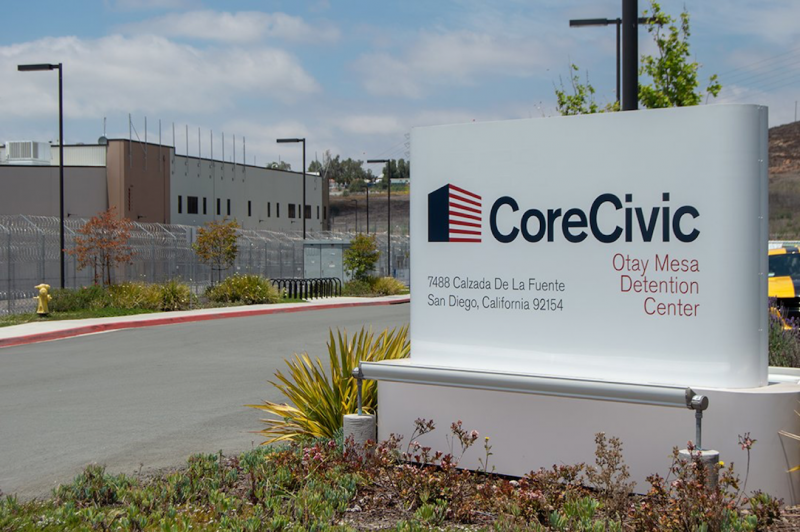Audio of the incident was also captured in a phone call recorded on April 10 by a volunteer with Pueblos Sin Fronteras, an immigration rights group, who was speaking with a detainee as the situation escalated.
On the recording, which was posted on Facebook, one of the women in Spanish says, “Please help us get out! They’re spraying pepper spray into the cells.”
Shortly after, she says, “They’re taking people out of the cells in handcuffs,” and then begins to shriek.
CoreCivic, the private prison operator that runs Otay Mesa under contract with ICE, denied that staff used force, and said in a statement, “regarding the pepper spray claim, those allegations are patently false.”
“The temporary removal of three detainees from one of the pods was in direct response to their being disruptive during the issuance of the face masks,” wrote Amanda Gilchrist, CoreCivic’s public affairs director. “At no time was any force used to remove these individuals, and they were returned to the pod a short while later.”
Gilchrist added that no signed waiver will be required to receive a mask, and that all detainees have been issued face masks. In her statement, she also said that CoreCivic is working with ICE medical staff to screen employees, disinfect surfaces, encourage social distancing and hand-washing and quarantine sick detainees and people they’ve had contact with.
But the company’s quarantine approach has raised concerns for another immigrant advocate. Attorney Dulce Garcia, executive director of the group Border Angels, said she’s been trying to post a bond for an asylum-seeker who has been approved for release but said officials told her he had to stay in his quarantined unit for 14 days, even though he’s not sick and hasn’t been tested for COVID-19.
“No one can get out of the cohort,” said Garcia. “Today we received notice that they moved someone who tested positive and had a fever last week into the cohort. Every time they put a new person in, the clock starts again. How will they ever get out?”
Garcia said her client has family in the U.S. with a home where he would be able to isolate himself upon his release. For now, she said, he is stuck in a unit with about 100 men sleeping in eight-person bunk rooms, eating together and sharing bathrooms.
“He’s afraid he’s going to die there,” said Garcia. “He’s desperate. He doesn’t know how to distance himself and he’s afraid everyone is going to give it to him.”
CoreCivic confirmed that housing pods at Otay Mesa with positive cases are under quarantine, and said “high-medical-risk detainees” are being separated. Gilchrist, the company spokeswoman, referred KQED to ICE for further comment, but they agency did not respond by press time.
ICE has reduced the number of people in custody nationally, from more than 38,000 three weeks ago to a total of just over 32,000 as of Saturday. There were 3,402 people in ICE’s four California detention facilities as of March 28, the most recent data available.
“Due to the unprecedented nature of COVID-19, U.S. Immigration and Customs Enforcement is reviewing cases of individuals in detention who may be vulnerable to the virus. Utilizing CDC guidance along with the advice of medical professionals, ICE may place individuals in a number of alternatives to detention options,” ICE said in a statement released by spokeswoman Paige Hughes.
Officials said they’ve released almost 700 medically-vulnerable immigrants, including pregnant women and people over 60.

